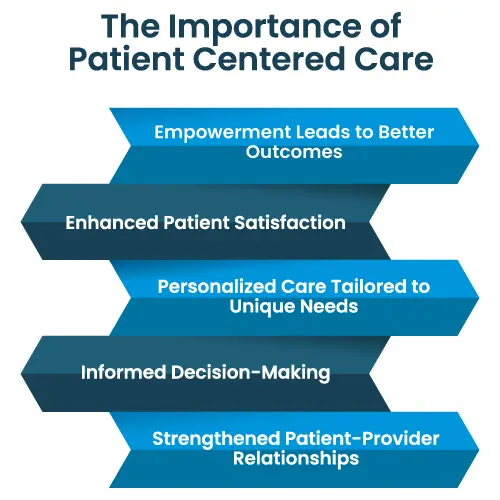
What Does A Low Temperature Mean? Could It Be Hypothermia
What Does A Low Temperature Mean? Could It Be Hypothermia Shivering hands, chattering teeth, and the desperate hunt for another blanket – we’ve all experienced

In the healthcare world, one term has risen above the rest, and for good reason: patient-centered care. It’s more than just a buzzword; it’s a paradigm shift that has the potential to revolutionize the way healthcare is delivered and experienced.
For healthcare providers, understanding and implementing patient-centered care is not just an option; it’s a necessity in today’s complex healthcare landscape. So, what exactly is patient-centered care, and why is it so crucial? Imagine a healthcare system where patients are not mere recipients of care but active participants in their own well-being.
In this blog, we will uncover the true meaning of patient-centered care and explore why it holds the key to improving not only healthcare outcomes but also the overall patient experience. Let’s dive in.
Patient-centered care is an approach that puts the patient in command to play an active role in their own care. When healthcare providers empower patients to make decisions about their own health and treatment, they have found that they are responding well to the conditions This shift from a traditional, directive model to one of collaboration has yielded remarkable results.
In this care model, patients are not merely passive recipients of instructions; they are co-pilots on their path to wellness. They’re encouraged to make informed decisions tailored to their specific needs, preferences, and values.
Patient Centered care is all about relationships and building trust between the healthcare provider and patient. By taking a more holistic approach to care, providers can develop meaningful relationships with their clients, which in turn promotes increased adherence to treatment plans.

Empowerment Leads to Better Outcomes
One of the most significant advantages of patient-centered care is its impact on health outcomes. When patients are empowered to actively participate in their care decisions, they become more engaged and motivated to follow treatment plans. This heightened level of commitment often results in improved health outcomes and a faster path to recovery.
Enhanced Patient Satisfaction
Patients who feel heard, respected, and involved in their care tend to be more satisfied with their healthcare experiences. Patient satisfaction isn’t just a feel-good metric; it’s also an indicator of the quality of care provided. Happy patients are more likely to have trust in their healthcare providers and are more likely to comply with recommended treatments.
Personalized Care Tailored to Unique Needs
Patient-centered care recognizes that one size does not fit all. Every patient is unique, with individual needs, values, and preferences. By tailoring care plans to each patient’s specific circumstances, healthcare providers can optimize treatment effectiveness. This personalized approach can also minimize the risk of unnecessary tests or treatments, improving resource utilization.
Informed Decision-Making
In the patient-centered care model, patients are not passive recipients of care; they are active participants in decision-making. Healthcare providers educate patients about their conditions, treatment options, and potential risks and benefits. Patients are encouraged to ask questions and make informed choices, ensuring that their care aligns with their goals and values.
Strengthened Patient-Provider Relationships
A patient-centered approach fosters stronger, more collaborative relationships between patients and healthcare providers. Trust and mutual respect become the foundation of these relationships. Patients are more likely to communicate openly about their concerns and adhere to treatment plans when they have a sense of partnership with their providers.
Patient-centered care in nursing is a holistic approach to patient care that focuses on the physical, psychological, spiritual, and social needs of patients. It emphasizes collaboration between the patient and healthcare provider to ensure that all decisions are made with the patient’s best interests in mind.
Nursing practices that promote patient-centered care include providing patient education, offering evidence-based treatments, engaging in active listening and communication, and building strong relationships.
Nurses are in a unique position to understand the needs of patients holistically and provide personalized, compassionate care. By following a patient-centered approach, nurses can ensure that every patient is treated with dignity and respect and receives the care they need to reach their goals.
The primary goal of patient centered care is that patients are positioned to make more informed decisions about their own health and become active participants in their care. Some of the key principles that underpin this goal include providing informed choices and empowering patients to make decisions based on their individual needs and values.
In Patient and family centered care, each family member is defined a specific role in assisting the patient with their healthcare needs. Involving family members in the care planning process helps to ensure that the patient’s needs are met, and their healthcare experience is positive.
Family-centered care puts an emphasis on respecting patients and families, partnering with them in decision-making, helping them access resources for support and education, providing opportunities to communicate openly about concerns and expectations, and involving families in transitions of care.
for example if the patient has arrived in the facility with their family, the healthcare provider should offer them time to provide emotional support and help with decision-making. Or if a patient requires long-term care, families can be involved in making decisions about where they will receive that care.
In conclusion, patient-centered care is an approach to healthcare delivery that focuses on the needs of individual patients. It emphasizes collaboration between the patient and healthcare provider, personalized care plans tailored to each patient’s unique circumstances, informed decision-making, and strengthened patient-provider relationships.
Nursing practices that promote this model include providing patient education, offering evidence-based treatments, engaging in active listening and communication, and building strong relationships.
By following the principles of patient-centered care, providers can ensure their patients receive comprehensive, compassionate care that meets their unique needs. With patient-centered care, healthcare providers can help their patients take an active role in managing their health and achieve better outcomes.

What Does A Low Temperature Mean? Could It Be Hypothermia Shivering hands, chattering teeth, and the desperate hunt for another blanket – we’ve all experienced

Understanding CMS Update Related To Medicare G Codes In Home Health Services Ever since the rise of telehealth has made home health services more accessible
Talk to an Expert Now